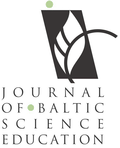GRADE 12 STUDENTS’ PERCEIVED SELF-EFFICACY TOWARDS WORKING LIFE SKILLS AND CURRICULUM CONTENT PROMOTED THROUGH SCIENCE EDUCATION
| Title | GRADE 12 STUDENTS’ PERCEIVED SELF-EFFICACY TOWARDS WORKING LIFE SKILLS AND CURRICULUM CONTENT PROMOTED THROUGH SCIENCE EDUCATION |
| Publication Type | Journal Article |
| Year of Publication | 2018 |
| Authors | Soobard, R, Semilarski, H, Holbrook, J, Rannikmäe, M |
| Journal | Journal of Baltic Science Education |
| Volume | 17 |
| Issue | 5 |
| Start Page | 838-850 |
| Pagination | Continuous |
| Date Published | October/2018 |
| Type of Article | Original article |
| ISSN | 1648-3898 |
| Other Numbers | E-ISSN 2538-7138 |
| Keywords | core ideas, science curriculum topics, science education, self-efficacy, working life skills |
| Abstract | This research was based on the concern that students didn’t see the need for the acquisition of science skills and knowledge perceived as important in relation to different society issues and the world of work. The aim was to determine gymnasium students perceived self-efficacy towards working life skills as well as science curriculum, content-related topics. The sample was composed of grade 12 (N=1375) 18-19-year-old students. Data were obtained using a 4-point Likert scale questionnaire seeking to determine students’ perceived self-efficacy towards working life skills and topics in the science curriculum linked to disciplinary core ideas. In general, students perceived their self-efficacy to be above average towards most needed working life skills. However, it was much lower in areas related to problem-solving skills and understanding the nature of science. Results also indicated that the self-efficacy associated with purely Physics curriculum-related topics stood out as being much lower than for the other school science subject areas. Findings suggested there was a need to re-thinking the way science content was presented to students and to consider whether and how this could be restructured around core ideas in science in order to promote the development of problem-solving skills as an important aspect in enhancing working life skills. |
| URL | http://oaji.net/articles/2017/987-1539418472.pdf |
| DOI | 10.33225/jbse/18.17.838 |
| Refereed Designation | Refereed |
| Full Text |
